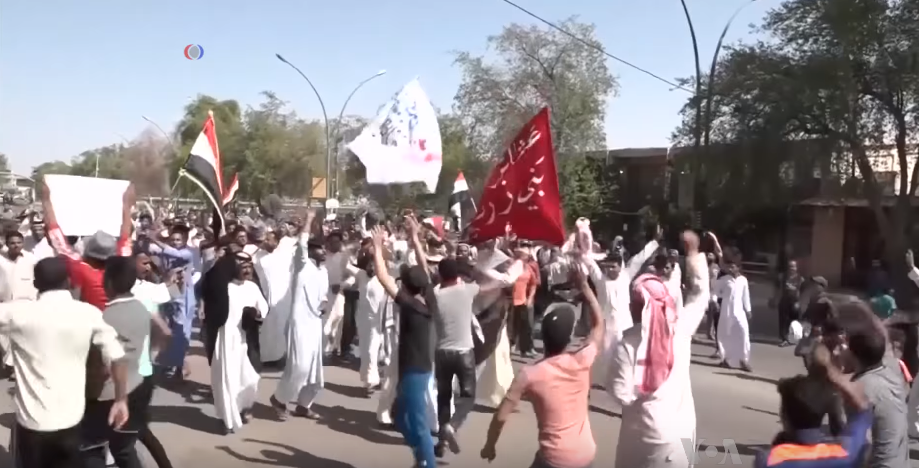The protest movement in southern Iraq has continued into its second week. The protest broke out on Sunday 8 July over the government's inability to provide basic services such as electricity and clean water. The protesters are also demanding jobs for the local population.
On 8 July, a group of protesters blocked the road to West Qurna: home of the largest oil field in Basra. The blockade of the road was an attempt to interrupt oil production. A group of 10 protesters broke into the facility, but the security forces regained control soon after. As Al-Monitor reports:
“Iraq needs more than 23,000MW of electricity per hour to ensure a nonstop supply to homes and public buildings. However, it cannot produce more than 15,700MW of electricity.”
Protest and state violence
With the temperature reaching highs of 50 degrees Celsius, most of the population still don’t have reliable access to electricity. They also must buy their water since the tap water is not drinkable.
The Prime Minister, Haider al-Abadi, responded by deploying security and counter-terrorist forces to quell the protests. The police intervention resulted in one death and three injuries. This sparked a bigger movement inside Basra, which also spread to other cities north of the province. In Najaf, the protesters disrupted operations at the international airport before the security forces regained control. The movement further extended to other cities, including Baghdad, where a smaller gathering in Tahrir Square took place.
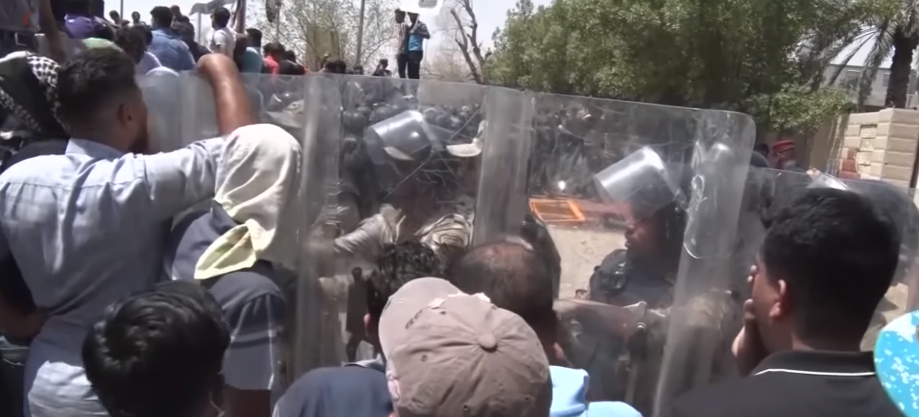 Prime Minister Haider al-Abadi deployed security and counter-terrorist forces to quell the protests / Image: fair use
Prime Minister Haider al-Abadi deployed security and counter-terrorist forces to quell the protests / Image: fair use
In Basra the protesters have attacked the government buildings, but in an unprecedented move they also attacked the Shia militia offices in the city. At the time of writing the death toll has reached 11 and hundreds are wounded. Some foreign oil companies have already evacuated their senior staff in fear of more violence erupting. The seriousness of the movement forced the government to slow or cut internet services across Iraq to stop the fire from spreading.
Abadi, while deploying counter-terrorist and security forces in tandem with Shia militias to suppress the movement, announced that he recognises the people’s right to conduct peaceful demonstrations, but vowed to act against the “small group of infiltrators who are trying to exploit peaceful demonstrations”. The government has also proceeded with the old trick of bribing tribal leaders to help them control the movement.
On his return from Brussels (where he was attending an ‘anti-ISIS coalition’ meeting), Abadi went directly to Basra to announce a $3bn investment in the province, promising further spending on housing, healthcare, education and so on. He was not received with applause, though. Instead a group of angry people attacked his hotel – although he was gone by the time the crowd arrived.
Sadr’s power ploy
The Shia militia leader, Muqtada al-Sadr, has exercised greater caution. He supported the demonstration passively but has not called on his supporters to come out. His actions can be understood in the context of the general political situation in Iraq. On 21 June, the court announced a recount of votes from the 12 May election. This means that the current government will extend its term until the end of the recount process, which has not started yet. Unsurprisingly, Sadr, the winner of the May election, is opposed to this.
Although he has not been part of the political establishment in Iraq in recent years, Sadr still enjoys a certain level of popularity (more accurately, he is less-hated by the masses). In fact, the Sadrists’ offices were less-targeted compared to other party offices during the recent protests. He intends to show his support for the people. But it would be a mistake to think that he has the interests of the Iraqi masses at heart. Sadr is fundamentally part of the establishment and he shares its interests.
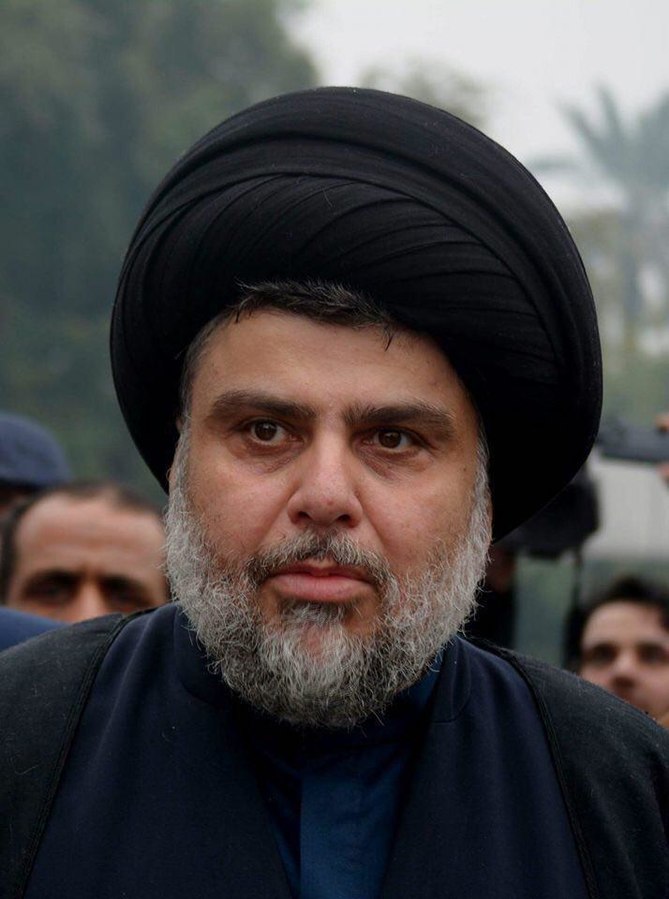 Sadr does not have the interests of the Iraqi people at heart, he is a (minor) player in the establishment and shares its interests / Image: public domain
Sadr does not have the interests of the Iraqi people at heart, he is a (minor) player in the establishment and shares its interests / Image: public domain
Indeed, it is precisely because Sadr has not been as involved in power as the other parties that he maintains a certain level of political capital amongst the masses. Representing a junior wing of the ruling class, he is leaning on the anger of the masses to carve out a slice of power for himself. But indicative of their true intentions, the Sadrists have already made an alliance with Abadi, Hadi al-Ameri (head of the Fatah bloc, and close to Iran) and Ammar al-Hakim (leader of the National Wisdom movement). So, all the old crew – as expected – got back together to form the next cabinet.
Sadr has also announced his support for the privatisation of the electricity sector in Iraq. Stopping this privatisation is in fact one of the protestors’ demands, as they see it will only result in an increase in the cost of electricity, while reducing the workforce employed by the state. This clearly shows on which side Sadr stands. Being a relatively weak member of the ruling class however, the big players are not very comfortable with the fact that now they must share power with him.
Establishment discredited
The present protest movement should not come as a surprise. Since the beginning of the Arab Revolution, protests started spreading to and throughout Iraq. The rise of ISIS cut across this process temporarily, but with the defeat of ISIS, daily protests are back on the agenda. This is contrary to Abadi and the Iraqi political establishment’s calculations. They thought the defeat of ISIS would grant them a certain level of authority. In fact, the war campaign not only exerted a huge human and economic cost, it further discredited the Iraqi establishment.
Mosul is still uninhabitable and most of the 2m internal refugees in Iraq are still waiting to return home. The government is unable to rebuild the north. The war and the atrocities carried against the majority Sunni northern regions of Iraq has also further alienated them. But in the Shia areas, politicians are little more popular. They thought they would emerge from the campaign to defeat ISIS as heroes and saviors of the people, enjoying popular support. In fact, the ‘return of security’ was one of Abadi’s main campaign slogans in the May election.
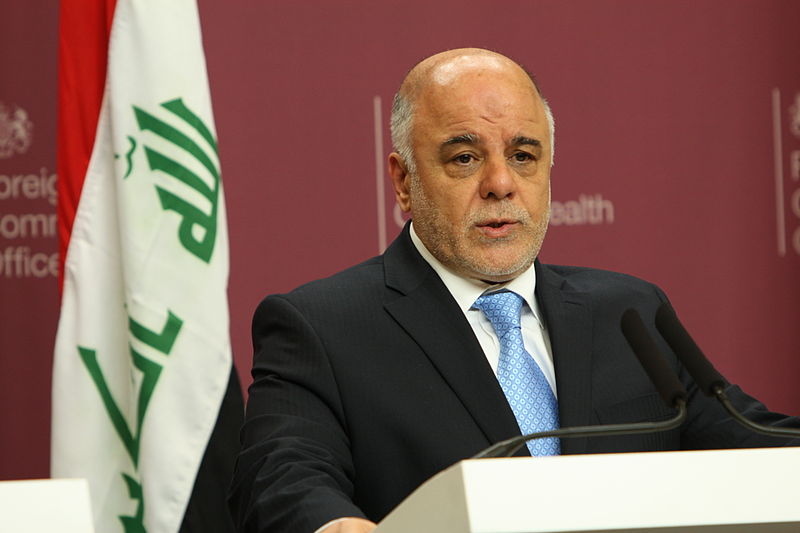 The discredited government leans on the tribal leaders and gangs. It was defeated in the May elections / Image: Foreign and Commonwealth Office
The discredited government leans on the tribal leaders and gangs. It was defeated in the May elections / Image: Foreign and Commonwealth Office
This proved to be a fantasy. This was already shown in the election, when none of the establishment candidates emerged as the victor, much to their bewilderment. If the distrust in the political establishment was expressed passively in the May election by the high rate of abstention, this time the masses are expressing themselves actively by burning down the government offices, including the militia offices.
A significant aspect of the recent wave of protests is that they are centered in the majority Shia provinces of the south. Basra and the south of Iraq are not only the economic lifelines of the country (where most of the oil lies), they are also where the postwar Iraqi political elite considers its base of support to reside. But things have got out of hand, even in the south. This shows the limits of sectarian policies pursued by the US in Iraq since the invasion in 2003.
Another problem raised by the protestors is the lack of security on the streets. In recent years, Iraq has witnessed a rise in tribal violence and criminal activity in the south as well. This is a symptom of a failing society that cannot provide for its population. In the absence of jobs, services and opportunities, the tribes and gangs are getting stronger as they seem to be the only ones that can provide through their system of patronage.
The government, far from reducing the influence of these elements, relies on them by bribing the tribal leaders and elders (the Sheikhs) in return for bringing stability in the region so that the multinationals can operate.
Deep crisis and mass movements
The situation is no better in the other regions in Iraq. In fact, Abadi’s main goal in the recent summit in Brussel was to ask for funding and weapons from Western countries. Just before the protest broke out in the south, ISIS increased its activity in the northern regions around Kirkuk. They kidnaped and later murdered eight members of the Iraqi security forces on the Erbil-Kirkuk road and in a later attack killed three more who were guarding a pipeline close to Kirkuk.
The political establishment in Iraq is in a deep crisis. While they are busy at their parliamentary game of alliances and counter-alliances, the living conditions of the masses is in freefall, to which the establishment is apparently blind and deaf. Abadi is busy trying to secure the position of prime minister in the next government and his approach to the protest is the same old story: intimidation, empty promises and buying alliances with the tribes to undermine the movement.
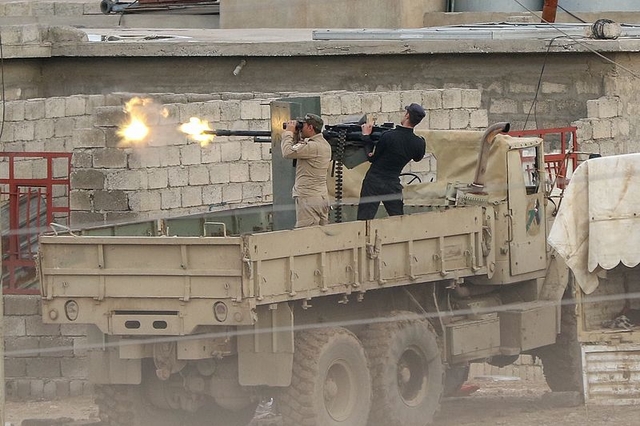 The government thought it would emerge heroically from the campaign against ISIS, but it is widely hated / Image: public domain
The government thought it would emerge heroically from the campaign against ISIS, but it is widely hated / Image: public domain
By these means – and given the lack of organisation behind the current movement – it is likely that the government will manage to weather the storm for now. But this can only be temporary, and it will prepare bigger explosions in the future. There is no way on earth they can solve any of the problems the people are facing.
The government in Iraq is extremely dysfunctional and mired in corruption at all levels. It is only concerned with filling its pockets before its time runs out and guaranteeing the function of multinational companies in the meantime. To do so, it bribes the tribal and gang leaders and starves the local population. The only way this can change is through a complete overthrow of the current system and its replacement with a new one.
This conclusion is becoming clearer every day to the people in Iraq. But the masses are not organised, which makes it easier for the government to suppress one demonstration with promises and intimidation and then move to the next one. The bankruptcy of the Communist Party is shown in the fact that, instead of being present on the streets to organise these demonstrations, it is busy forming alliances with Sadr. Given the absence of any organised leadership, the path ahead could be long and painful. But the Iraqi ruling class is also weak, with no base of support in the population. If faced with an organised movement it would collapse like a house of cards.
The current events in Iraq should also be seen in conjunction with recent developments in the rest of the Middle East. We have just witnessed the protests in Jordan that brought down the prime minister. Over the eastern border, there is an ongoing crisis in Iran. This situation in Iraq is part of a new wave of mass movements across the region.
24 July 2018
